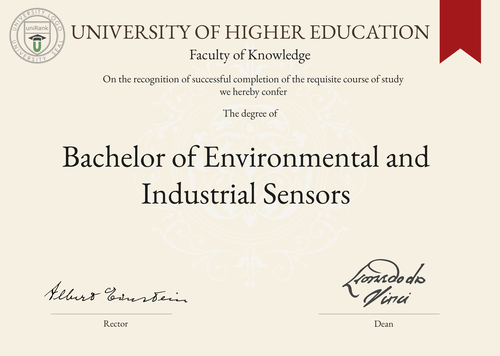
Bachelor of Environmental and Industrial Sensors (B.E.I.S.)
Guide to Bachelor of Environmental and Industrial Sensors Program/Course/Degree
Bachelor of Environmental and Industrial Sensors (B.E.I.S.)

Program Name:
Bachelor of Environmental and Industrial SensorsProgram or Degree abbreviation:
B.E.I.S.Duration range:
The duration of the program typically ranges from 3 to 4 years.Tuition range:
The tuition fees for the program can vary depending on the chosen country or university. It is recommended to check with specific institutions for accurate information.Overview:
The Bachelor of Environmental and Industrial Sensors program focuses on the study of sensors used in environmental monitoring and industrial processes. Students gain knowledge and skills in designing, developing and implementing sensor technologies for various applications.Curriculum Overview by year:
- Year 1: Introduction to Sensors, Mathematics for Sensors, Physics Fundamentals, Programming Basics - Year 2: Sensor Technologies, Data Analysis, Instrumentation, Environmental Monitoring - Year 3: Industrial Sensors, Signal Processing, Quality Control, Project Management - Year 4: Advanced Sensor Applications, Research Methods, Internship, Final ProjectKey Components:
The key components of the program include sensor technologies, data analysis, instrumentation, environmental monitoring, industrial sensors, signal processing, quality control, project management and advanced sensor applications.Career Prospects:
Graduates of the Bachelor of Environmental and Industrial Sensors program can pursue careers in various industries such as environmental monitoring, manufacturing, energy, agriculture and research organizations. They can work as sensor engineers, quality control specialists, environmental consultants, research scientists, or project managers.Salary Expectations:
The salary expectations for graduates of this program can vary depending on factors such as job location, industry and level of experience. It is advisable to research specific job markets for accurate salary information. For a more accurate understanding of salary expectations, you can utilize the Job Sites Search Engine, from our sister site jobRank, which searches over 4,600 job sites worldwide. Make sure to specify not only the job title but also the country you are interested in.Conclusions:
It is important to note that the duration, tuition fees, curriculum, key components, career prospects and salary expectations of the Bachelor of Environmental and Industrial Sensors program can vary. These variations can be influenced by the chosen country or location where the program is studied, as well as the chosen university. Prospective students are encouraged to explore different universities and countries to find the best fit for their educational and career goals. Visitors can search for institutions offering the Bachelor of Environmental and Industrial Sensors program worldwide through the uniRank World Universities Search Engine.World Universities Search Engine
search for Bachelor of Environmental and Industrial Sensors (B.E.I.S.) and add the Location (country, state etc.) or specific University you are interested in studying at.
Query examples:
- Bachelor of Environmental and Industrial Sensors (B.E.I.S.) United States
- Bachelor of Environmental and Industrial Sensors (B.E.I.S.) United Kingdom online
- Bachelor of Environmental and Industrial Sensors (B.E.I.S.) Australia international students
- Bachelor of Environmental and Industrial Sensors (B.E.I.S.) University of California
- Bachelor of Environmental and Industrial Sensors (B.E.I.S.) University of London tuition fees
- Bachelor of Environmental and Industrial Sensors (B.E.I.S.) University of Sydney scholarships
Share Program/Course
Interesting? Share this program/course/degree info with your friends now.